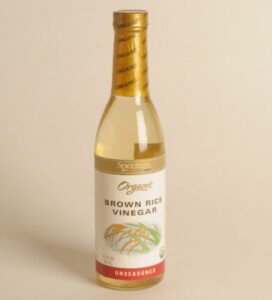Medically reviewed by Dr. Ramesh Gaddam, M.D. — Written by Sumalatha, D.N.H.E
Table of Contents
ToggleRice vinegar is a type of vinegar made from fermented rice. It is commonly used in Asian cuisine, particularly in Japanese, Chinese, and Korean dishes.
Rice vinegar has a mild, slightly sweet flavor compared to other types of vinegar, making it a versatile ingredient for dressings, marinades, sushi rice, and pickling.
There are several varieties, including white, black, and red rice vinegar, each with unique flavor profiles and culinary uses. Its mild acidity enhances flavors without overpowering dishes.
1. Uses of Rice Vinegar
Rice vinegar is a versatile ingredient that enhances the flavor and texture of various dishes.

Here are some common and creative uses for rice vinegar in cooking:
Pickling
Rice vinegar is a popular choice for pickling due to its mild flavor and acidity.
It is used to pickle a variety of vegetables, such as cucumbers, carrots, radishes, and onions.
The vinegar helps preserve the vegetables and imparts a tangy taste, making them a great addition to salads, sandwiches, and as a side dish.
Salad Dressings
Rice vinegar is a key ingredient in many salad dressings.
Its mild acidity pairs well with oils, herbs, and spices, creating a balanced vinaigrette.
It can be used in simple dressings with just oil and seasoning or in more complex dressings that include soy sauce, ginger, and sesame oil.
Marinades
Using rice vinegar in marinades helps tenderize meat and infuse it with flavor.
It is commonly used in marinades for chicken, pork, and beef, often combined with soy sauce, garlic, and ginger.
The acidity of the vinegar breaks down proteins, resulting in more tender and flavorful meat.
Sauces and Dips
Rice vinegar adds a tangy element to various sauces and dips.
It is a staple in Asian sauces like teriyaki, ponzu, and dipping sauces for dumplings and spring rolls.
The vinegar balances the sweetness and saltiness of other ingredients, creating a well-rounded flavor.
Sushi Rice
Rice vinegar is essential in preparing sushi rice. It is mixed with sugar and salt, then folded into cooked rice to give it a slightly sweet and tangy flavor.
This seasoned rice is used as the base for sushi rolls, nigiri, and other sushi dishes.
Stir-Fries
A splash of rice vinegar in stir-fries adds brightness and balances the richness of the dish.
It is often added towards the end of cooking to preserve its flavor. Rice vinegar complements ingredients like soy sauce, garlic, and vegetables, enhancing the overall taste.
Soups
Incorporating rice vinegar into soups adds a subtle acidity that brightens the flavors.
It is particularly effective in hot and sour soup, miso soup, and other Asian-inspired broths.
The vinegar can be added to taste, balancing the soup’s savory and umami notes.
Pickled Ginger
Rice vinegar is used to make pickled ginger, also known as gari, which is a common accompaniment to sushi.
The ginger is sliced thin and pickled in a mixture of rice vinegar, sugar, and salt.
This tangy, sweet, and slightly spicy condiment cleanses the palate between bites of sushi.
Preserving Fruits
Rice vinegar can be used to preserve fruits, similar to pickling vegetables.
Fruits like strawberries, peaches, and plums can be pickled in a sweetened rice vinegar solution.
These pickled fruits can be used as toppings for desserts, yogurt, or as a unique addition to salads.
Baking
Rice vinegar can be used in baking to add a slight tang and enhance the texture of baked goods.
It reacts with baking soda to help cakes and breads rise. It is often used in recipes for light and fluffy cakes, cookies, and even some bread recipes.
By understanding the diverse uses of rice vinegar, you can incorporate this versatile ingredient into a wide range of dishes, enhancing their flavor and achieving delicious culinary results.
2. Reasons for Seeking Substitutes
People may seek substitutes for Rice Vinegar for various reasons, including dietary preferences, health concerns, allergies, and taste preferences.

Here are some common factors:
Availability
Rice vinegar may not always be readily available in your pantry or local grocery store.
Depending on where you live, it might be a specialty item that’s harder to find. In such cases, having a substitute on hand allows you to continue with your recipe without interruption.
Dietary Restrictions and Allergies
Some individuals may have dietary restrictions or allergies that prevent them from consuming rice or rice-based products.
For example, someone with a rice allergy would need to avoid rice vinegar and find a suitable alternative that doesn’t trigger their allergy.
Flavor Preferences
Personal taste preferences can also be a reason to seek substitutes.
Some people might find the mild sweetness of rice vinegar less appealing and may prefer a vinegar with a stronger or different flavor profile.
Substituting rice vinegar with an alternative can help tailor the dish to their liking.
Health Considerations
Certain health considerations may prompt the need for a substitute.
For instance, some people might be reducing their carbohydrate intake and prefer to avoid rice-based products.
Others might be looking for vinegars with specific health benefits that rice vinegar does not provide.
Culinary Experimentation
Culinary experimentation and creativity can lead to the use of substitutes.
Chefs and home cooks might want to explore how different vinegars alter the flavor and texture of their dishes.
Using substitutes allows for unique variations and can inspire new recipes.
Cost
Rice vinegar might be more expensive than other types of vinegar, particularly if it is a specialty or imported product.
In budget-conscious cooking, finding a more affordable alternative can be practical while still achieving a similar culinary effect.
Cultural Preferences
Cultural or regional culinary practices might favor other types of vinegar over rice vinegar.
Depending on the cuisine being prepared, a different vinegar might be more authentic or traditionally used. Seeking a substitute can align the dish more closely with cultural or regional tastes.
3. Nutrition of Rice Vinegar
Nutritional Profile of Rice Vinegar (per 100 ml)
| Nutrient | Amount | Benefits |
|---|---|---|
| Calories | 18 kcal | Low calorie count, suitable for weight management |
| Protein | 0 g | Not a significant source of protein |
| Total Fat | 0 g | No fat content, good for low-fat diets |
| Carbohydrates | 4 g | Provides minimal carbohydrates |
| Sugars | 0 g | No sugar content, does not impact blood sugar levels |
| Fiber | 0 g | No fiber content |
| Sodium | 1 mg | Very low sodium content |
| Potassium | 2 mg | Minor contribution to daily potassium intake |
4. Health Considerations
When incorporating rice vinegar into your diet, there are several health considerations to keep in mind.

While rice vinegar is generally safe and beneficial, understanding its potential effects can help you use it more effectively and avoid any adverse outcomes.
Low Calorie and Fat Content
Rice vinegar is very low in calories and contains no fat, making it an excellent choice for those who are managing their weight or following a low-fat diet.
It can add flavor to foods without significantly increasing the calorie content, helping to maintain a balanced diet.
Digestive Health
The acidity of rice vinegar can aid in digestion. It stimulates the production of digestive juices and enzymes, which can help break down food more efficiently.
However, for individuals with acid reflux or a sensitive stomach, the acidity might exacerbate symptoms, so it should be used in moderation.
Blood Sugar Regulation
Rice vinegar has a low glycemic index, which means it has minimal impact on blood sugar levels. This makes it a good option for people with diabetes or those looking to maintain stable blood sugar levels. It can be used to flavor foods without causing spikes in blood sugar.
Potential Allergies
While rare, some individuals may have allergies to rice or rice-based products, including rice vinegar.
Symptoms can include itching, hives, or more severe reactions like anaphylaxis. It’s important for individuals with known allergies to avoid rice vinegar and seek suitable alternatives.
Sodium Content
Rice vinegar typically contains very low levels of sodium, which is beneficial for those monitoring their sodium intake for blood pressure or heart health reasons.
However, commercially flavored rice vinegars might have added sodium, so it’s important to check the labels.
Dental Health
The acidity in rice vinegar, like other vinegars, can erode tooth enamel over time if consumed in large amounts.
To minimize this risk, it’s recommended to use rice vinegar in moderation, avoid prolonged contact with teeth, and rinse your mouth with water after consumption.
Antimicrobial Properties
Rice vinegar has natural antimicrobial properties, which can help reduce the risk of foodborne illnesses.
It is often used in pickling and preserving foods, where it helps inhibit the growth of harmful bacteria.
Interaction with Medications
Vinegars, including rice vinegar, can interact with certain medications, especially those affecting blood sugar and potassium levels.
Individuals taking such medications should consult with their healthcare provider to ensure that including rice vinegar in their diet is safe.
5. Healthy Substitutes for Rice Vinegar
When you find yourself in need of a rice vinegar substitute, several alternatives can effectively replicate its flavor profile and acidity level.
Let’s explore some common substitutes:
1. White Vinegar

White vinegar has a sharp and tangy taste, with a clean and neutral flavor profile.
It lacks the subtle sweetness of rice vinegar but provides a strong acidic punch.
Similar to rice vinegar, white vinegar boasts a high acidity level, making it suitable for recipes that require a tangy bite.
White vinegar is an excellent choice for pickling vegetables, creating marinades for meats, and preparing salad dressings.
Its strong acidity complements bold flavors and can cut through rich dishes.
2. Apple Cider Vinegar

Apple cider vinegar offers a unique flavor characterized by its fruity notes and subtle sweetness, derived from fermented apple juice.
While it lacks the distinct rice vinegar flavor, it adds a pleasant hint of apple to dishes.
Slightly lower in acidity compared to rice vinegar, apple cider vinegar still provides a tangy kick that brightens up recipes.
Apple cider vinegar is versatile and can be used in various culinary applications.
It works well in sauces, vinaigrettes, and marinades, especially those with sweeter undertones. Additionally, it can add depth to braised dishes and sauces, balancing out richer flavors.
3. White Wine Vinegar

White wine vinegar boasts a mild and delicate flavor, with subtle fruity notes derived from fermented white wine.
It lacks the rice vinegar’s rice-derived aroma but offers a gentle acidity.
Comparable to rice vinegar in acidity, white wine vinegar provides a balanced tang that enhances the flavor of dishes without overpowering them.
White wine vinegar is ideal for recipes that require a nuanced acidity. It works well in delicate sauces, dressings, and marinades, where its subtle flavor can shine.
It pairs beautifully with seafood, poultry, and light salads, adding brightness without dominating the dish’s flavor profile.
4. Lemon or Lime Juice

Fresh and citrusy, lemon or lime juice brings a vibrant acidity and refreshing zest to dishes. While it lacks the fermented complexity of rice vinegar, it offers a bright and lively flavor.
Naturally acidic, lemon or lime juice provides a tangy kick that can elevate the taste of various recipes. However, its acidity is less concentrated than vinegar, requiring adjustments in quantity.
Lemon or lime juice is best used in recipes that benefit from a burst of fresh citrus flavor.
It pairs well with seafood, salads, and grilled meats, adding a refreshing contrast to savory dishes.
Additionally, it can be used in marinades, sauces, and dressings, contributing acidity and brightness to the final dish.
Summary:
By understanding the unique characteristics of these rice vinegar substitutes, you can confidently choose the best option based on your recipe requirements and personal taste preferences.
Whether you’re pickling vegetables, preparing marinades, or crafting salad dressings, these alternatives offer versatility and flavor that can enhance your culinary creations.
6. Factors to Consider When Choosing a Substitute
When selecting a substitute for rice vinegar, several factors should be taken into account to ensure that the chosen alternative complements your recipe effectively.

Here are key considerations to keep in mind:
Flavor Compatibility:
Consider the flavor profile of the substitute and how it will harmonize with the other ingredients in your dish.
While white vinegar offers a sharp tang, apple cider vinegar adds a hint of fruity sweetness.
Choose a substitute that aligns well with the overall flavor profile of your recipe.
Acidity Level:
Pay attention to the acidity level of the substitute compared to rice vinegar.
While some substitutes, like white vinegar and white wine vinegar, have similar acidity levels, others, such as lemon or lime juice, may be less concentrated.
Adjust the quantity of the substitute accordingly to achieve the desired level of acidity in your dish.
Color Impact:
Consider the color of the substitute and how it may affect the appearance of your final dish.
White vinegar and white wine vinegar are clear, while apple cider vinegar has a slightly amber hue.
Lemon or lime juice may add a subtle yellow or green tint. Choose a substitute that complements the visual presentation of your recipe.
Availability and Accessibility:
Take into account the availability of the substitute in your pantry or local grocery store.
While some substitutes, like white vinegar, are widely available, others may be more specialty items.
Choose a substitute that is readily accessible to you to ensure convenience in cooking.
Allergies or Dietary Restrictions:
Consider any allergies or dietary restrictions of individuals consuming the dish. For example, if someone has an allergy to apples, apple cider vinegar may not be suitable.
Similarly, individuals with citrus allergies should avoid substitutes like lemon or lime juice.
Choose a substitute that accommodates any dietary restrictions or preferences.
7. Tips for Using Substitutes Effectively

To ensure successful substitution and optimal flavor in your recipes, here are some valuable tips to keep in mind when using rice vinegar substitutes:
Adjust Quantities:
Since each substitute has its own flavor profile and acidity level, it’s essential to adjust the quantity accordingly.
Start by substituting the same amount of the alternative vinegar or citrus juice as the recipe calls for rice vinegar.
Taste the dish as you go and add more if needed to achieve the desired flavor balance.
Test in Small Amounts:
Before adding the substitute to the entire dish, it’s wise to test it in a small amount first.
This allows you to gauge its impact on the flavor without committing to the entire recipe. Adjust as necessary based on the taste test results.
Consider Complementary Flavors:
When using a substitute, consider how it will interact with the other ingredients in the dish.
Choose complementary flavors that enhance the overall taste profile.
For example, if substituting with apple cider vinegar, consider pairing it with ingredients that complement its fruity sweetness, such as honey or mustard.
Storing and Preserving:
If you have leftover substitute vinegar or citrus juice, store it properly to maintain its freshness. Vinegars can be stored in a cool, dark place, while citrus juice should be refrigerated.
Use airtight containers to prevent flavor degradation and preserve the quality of the substitute for future use.
8. Rice Vinegar Disadvantages
While rice vinegar offers several health benefits and culinary uses, there are some disadvantages to be aware of.
Understanding these drawbacks can help you use rice vinegar wisely and avoid potential negative effects.
High Acidity
One of the primary concerns with rice vinegar is its high acidity. This can lead to several issues:
Digestive Problems
For individuals with acid reflux, ulcers, or sensitive stomachs, the acidity of rice vinegar can exacerbate symptoms such as heartburn and stomach discomfort.
Dental Health
The acidic nature of rice vinegar can erode tooth enamel over time, leading to increased sensitivity and a higher risk of cavities.
To minimize this risk, it’s recommended to use rice vinegar in moderation and rinse your mouth with water after consumption.
Potential Allergens
Although rare, some people may have allergies to rice or rice-based products, including rice vinegar.
Allergic reactions can range from mild symptoms like itching and hives to severe reactions like anaphylaxis.
Individuals with known rice allergies should avoid rice vinegar and seek alternative options.
Sodium Content in Flavored Varieties
While plain rice vinegar is typically low in sodium, flavored varieties may contain added salt and other ingredients that increase sodium content.
High sodium intake is associated with elevated blood pressure and an increased risk of heart disease.
Always check the labels of flavored rice vinegars to monitor sodium levels.
Blood Sugar Interaction
Although rice vinegar generally has a low glycemic index, consuming it in large quantities could potentially affect blood sugar levels.
This is particularly important for people with diabetes or those taking medications that regulate blood sugar.
Moderation is key, and individuals with such conditions should monitor their blood sugar levels when incorporating rice vinegar into their diet.
Medication Interactions
Vinegars, including rice vinegar, can interact with certain medications, especially those affecting blood sugar and potassium levels.
For instance, those taking insulin or diuretics should consult with their healthcare provider before regularly using rice vinegar, as it could alter the effectiveness of these medications or exacerbate side effects.
Risk of Overuse
Like any ingredient, overusing rice vinegar can lead to health issues.
Excessive consumption can irritate the digestive system, lead to nutrient imbalances, or contribute to other health problems.
It’s important to use rice vinegar in moderation and as part of a balanced diet.
Quality and Additives
Not all rice vinegar products are created equal. Some commercially available rice vinegars may contain additives, preservatives, or artificial flavors that could diminish the health benefits or introduce unwanted chemicals into your diet.
Opting for high-quality, organic rice vinegar without additives is a better choice for maximizing benefits and minimizing potential risks.
9. Rice Vinegar Substitute for Sushi

When making sushi, rice vinegar plays a crucial role in seasoning the rice. If you don’t have rice vinegar, you can use these alternatives to achieve a similar taste:
Apple Cider Vinegar
- Apple cider vinegar has a mild flavor and acidity that works well as a substitute for rice vinegar in sushi.
- Use it in the same amount as rice vinegar.
White Wine Vinegar
- White wine vinegar is another good substitute due to its mild taste.
- It’s slightly more acidic, so you may want to use a little less than the recipe calls for.
Lemon or Lime Juice
- For a citrusy twist, lemon or lime juice can replace rice vinegar.
- Use slightly less than the recipe suggests, as these juices are more acidic.
Champagne Vinegar
- Champagne vinegar is a mild and slightly sweet vinegar that can substitute rice vinegar in sushi rice.
- Use it in equal amounts to rice vinegar.
10. Rice Vinegar Substitute for Mirin

Mirin is a sweet rice wine used in Japanese cooking, often containing rice vinegar. Here are some substitutes if you don’t have mirin:
Sake and Sugar
- Mix 1 tablespoon of sake with 1/2 teaspoon of sugar to substitute for 1 tablespoon of mirin.
- This combination mimics the sweetness and slight acidity of mirin.
Dry Sherry
- Dry sherry can replace mirin in recipes.
- Use the same amount as you would mirin and add a pinch of sugar to achieve the desired sweetness.
White Wine and Sugar
- Combine 1 tablespoon of white wine with 1/2 teaspoon of sugar to substitute for 1 tablespoon of mirin.
- This mixture will give you a similar flavor profile.
Sweet Marsala Wine
- Sweet Marsala wine can be used as a substitute for mirin due to its sweet and slightly tangy flavor.
- Use it in equal amounts to mirin.
11. Rice Vinegar Substitute for Stir-Fry

Stir-fries often use rice vinegar to add acidity and enhance flavors. If you’re out of rice vinegar, consider these alternatives:
White Vinegar
- White vinegar is more acidic than rice vinegar but can be used in stir-fries.
- Use slightly less than the recipe calls for to avoid overpowering the dish.
Balsamic Vinegar
- Balsamic vinegar provides a sweet and tangy flavor.
- It’s darker and richer, so use it in moderation to prevent altering the dish’s flavor too much.
Apple Cider Vinegar
- Apple cider vinegar offers a mild and fruity flavor similar to rice vinegar.
- Use it in equal amounts as a substitute in stir-fries.
Lemon or Lime Juice
- Citrus juices can add the necessary acidity to your stir-fry.
- Use slightly less lemon or lime juice than the amount of rice vinegar required.
By using these substitutes, you can maintain the intended flavor profiles in your sushi, mirin-based recipes, and stir-fries even when rice vinegar isn’t available.
12. Healthy Rice Vinegar Substitutes
When looking for healthy substitutes for rice vinegar, consider options that provide similar acidity and flavor while offering additional health benefits. Here are some nutritious alternatives:
Apple Cider Vinegar
Apple cider vinegar is a great substitute for rice vinegar. It has a mild flavor and contains beneficial probiotics and enzymes.
It’s known for its potential health benefits, including aiding digestion and supporting weight loss. Use it in equal amounts to rice vinegar.
Lemon or Lime Juice
Fresh lemon or lime juice can provide a similar tangy flavor as rice vinegar.
These citrus juices are rich in vitamin C and antioxidants, which can boost your immune system and improve skin health. Use slightly less than the recipe calls for, as these juices are more acidic.
White Wine Vinegar
White wine vinegar is another suitable substitute for rice vinegar. It has a mild taste and can be used in the same quantity.
White wine vinegar contains some antioxidants and has potential antimicrobial properties.
Champagne Vinegar
Champagne vinegar is a light, mild vinegar that can replace rice vinegar in most recipes.
It offers a delicate flavor and can be used in equal amounts. Champagne vinegar is low in calories and can add a gourmet touch to your dishes.
Balsamic Vinegar
While balsamic vinegar is richer and sweeter than rice vinegar, it can still be used as a healthy substitute in some recipes.
Balsamic vinegar is high in antioxidants and has been linked to improved heart health and reduced risk of chronic diseases. Use it in moderation to avoid overpowering the dish.
Coconut Vinegar
Coconut vinegar, made from the sap of coconut blossoms, is a nutritious alternative.
It contains probiotics, vitamins, and minerals. It’s less acidic than rice vinegar, so you may need to use slightly more to achieve the desired flavor.
Red Wine Vinegar
Red wine vinegar is a flavorful substitute that also offers health benefits.
It contains antioxidants from red wine, which can help reduce inflammation and support heart health. Use it in the same amount as rice vinegar.
Herb-Infused Vinegars
Infused vinegars, such as those made with herbs like rosemary, thyme, or basil, can provide unique flavors and additional health benefits.
These vinegars can add a burst of flavor to your dishes while also offering the benefits of the herbs used in the infusion.
By using these healthy substitutes, you can maintain the desired acidity and flavor in your recipes while also adding nutritional value.
13. Frequently Asked Questions (FAQs)
What can I use in place of Rice Vinegar?
If you’re looking for alternatives to rice vinegar, consider using:
- Apple cider vinegar
- White wine vinegar
- Lemon or lime juice
- Champagne vinegar
- Coconut vinegar or red wine vinegar
These alternatives provide similar acidity and flavor profiles, making them suitable replacements in various recipes.
What can I substitute for rice wine vinegar?
For rice wine vinegar, you can use substitutes such as apple cider vinegar, white wine vinegar, champagne vinegar, or a combination of sake and sugar.
These alternatives offer similar acidity and flavor profiles, ensuring that your dishes maintain their intended taste.
What is a good substitute for rice vinegar?
A good substitute for rice vinegar includes options like apple cider vinegar, white wine vinegar, or lemon/lime juice.
These alternatives provide similar acidity and flavor profiles, making them suitable replacements in recipes where rice vinegar is called for.
What is a good substitute for rice wine vinegar?
For rice wine vinegar, good substitutes include apple cider vinegar, white wine vinegar, or champagne vinegar.
These alternatives offer similar acidity and flavor profiles, ensuring that your dishes maintain their intended taste.
How to substitute rice vinegar?
To substitute rice vinegar, you can use alternatives like apple cider vinegar, white wine vinegar, lemon or lime juice, champagne vinegar, coconut vinegar, or red wine vinegar.
Use them in the same quantity as rice vinegar in your recipes for similar results.
What is rice wine vinegar substitute?
Rice wine vinegar substitutes include options like apple cider vinegar, white wine vinegar, champagne vinegar, or a combination of sake and sugar.
These alternatives provide similar acidity and flavor profiles, ensuring that your dishes maintain their intended taste.
Black Rice Vinegar Substitute
A suitable substitute for black rice vinegar is balsamic vinegar.
Its rich, slightly sweet flavor can mimic the complexity of black rice vinegar in dishes like stir-fries and marinades.
Brown Rice Vinegar Substitute
You can substitute brown rice vinegar with apple cider vinegar or white wine vinegar.
Both options offer a mild acidity similar to brown rice vinegar, making them suitable replacements in dressings and sauces.
Seasoned Rice Vinegar Substitute
For seasoned rice vinegar, combine equal parts of unseasoned rice vinegar with a pinch of sugar and salt to replicate the flavor profile.
Alternatively, use white wine vinegar with a touch of sugar for a similar taste.
White Rice Vinegar Substitute
A good substitute for white rice vinegar is distilled white vinegar.
It has a similar acidity level and can be used interchangeably in recipes such as salad dressings and pickling solutions.
Rice Vinegar Substitute for Sushi
When substituting rice vinegar for sushi, use a combination of white vinegar and a small amount of sugar.
This mixture closely resembles the mild sweetness of rice vinegar and is ideal for seasoning sushi rice.
Best Rice Vinegar Substitute
The best substitute for rice vinegar depends on the recipe and personal preference.
Common options include apple cider vinegar, white wine vinegar, and distilled white vinegar, each offering a slightly different flavor profile.
Rice Vinegar Substitute for White Vinegar
White wine vinegar or distilled white vinegar are suitable substitutes for white vinegar in recipes calling for rice vinegar.
Adjust the quantity to match the desired level of acidity and flavor.
Rice Vinegar Substitute Red Wine Vinegar
Red wine vinegar can substitute rice vinegar in certain recipes, but it will impart a stronger flavor and deeper color.
Use it sparingly and consider diluting with water or mixing with a bit of sugar to balance the acidity.
Can Rice Vinegar Substitute White Vinegar?
Yes, rice vinegar can substitute white vinegar in most recipes.
However, be mindful of the slight differences in flavor and acidity levels, and adjust the quantity accordingly to achieve the desired taste.
Unseasoned Rice Vinegar Substitute
For unseasoned rice vinegar, use distilled white vinegar or apple cider vinegar.
These alternatives provide a clean acidity without added seasonings, making them versatile options in various dishes.
Rice Vinegar Substitute Apple Cider
Apple cider vinegar can be used as a substitute for rice vinegar in many recipes.
Its mild acidity and fruity undertones complement a wide range of dishes, from salads to marinades.
Rice Vinegar Substitute for Sushi Rice
To substitute rice vinegar for sushi rice, combine white vinegar with a small amount of sugar.
This mixture closely mimics the flavor of rice vinegar and is suitable for seasoning sushi rice for authentic taste.
Chinese Rice Vinegar Substitute
Chinese rice vinegar can be replaced with a combination of equal parts distilled white vinegar and apple cider vinegar.
This blend provides a similar acidity and flavor profile, ideal for Chinese-inspired dishes.
Also Read:
11 Only Healthy Mayonnaise Substitutes (Tasty Alternatives)
Coke: How Much Sugar Is in a Can of Coke (3 Amazing Facts)
Medically reviewed by Dr. Ramesh Gaddam, M.D.

General Physician, Diabetologist, and Critical Care Specialist.
Related
Discover more from Health Build-Up
Subscribe to get the latest posts sent to your email.

2 thoughts on “4 Only Best Rice Vinegar Substitutes (Healthy Alternatives)”
Comments are closed.